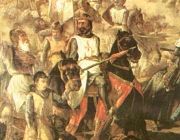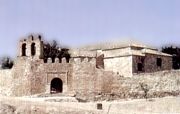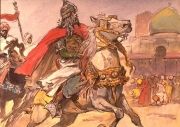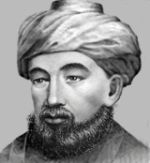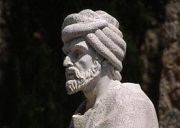Supported by Christian military orders and crusaders, the rulers of Castile, Aragon, Navarre, and Portugal defeat the Almohads during the Battle of Las Navas de Tolosa. In the following decades, Almohad power in Spain declines, leaving Andalusi cities vulnerable to conquest. During this time, the longest lasting Muslim dynasty in…
Almohads Defeat Alfonso VIII
The Almohads — with the help of a Castilian cavalry faction — defeat Alfonso VIII, the King of Castile, at the Battle of Alarcos.
Salah al-Din (Saladin) Reclaims Jerusalem
In the east, Muslim leader Salah al-Din (Saladin) reclaims Jerusalem after defeating Crusader forces at the Battle of Hattin. Andalusi scholar Ibn Jubayr describes fascinating scenes of Mediterranean life in his Rihla (“Travel Account”). He pens this piece on a Genoese ship traveling from Murcia to Alexandria en route to…
Abu Yusuf Yaqub Orders the Construction of the Great Mosque of Seville
Almohad ruler Abu Yusuf Yaqub orders the construction of the Great Mosque of Seville with a 300-ft. tall minaret, now known as the Giralda, near the Alcazar palace. A few years later, the Almohads make Seville their capital. From there, they hope to restore the boundaries of Al-Andalus eroded by…
Moses Maimonides Travels To Jerusalem
After living several years in Fes, Córdoban scholar and rabbi Moses Maimonides travels to Jerusalem. He soon becomes the court physician for the Muslim ruler, Salah al-Din (Saladin), in Cairo. Maimonides authors several major philosophical, medical, and religious texts, including the commentary Mishnah Torah and the Moreh Nevuchim (“The Guide…
Ibn Rushd Becomes Chief Qadi
Scholar Ibn Rushd becomes chief qadi (judge) of Seville, after being introduced to the Almohad court by philosopher Ibn Tufayl. Serving in Córdoba and later in Marrakesh, he continues to practice medicine and write a range of legal, mathematical, and philosophical treatises, including important commentaries on Aristotle.

